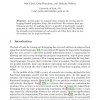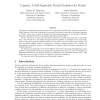87 search results - page 3 / 18 » Functions and Lazy Evaluation in Prolog |
IFL
2000
Springer
14 years 1 months ago
2000
Springer
Abstract. In this paper we compare three systems for tracing and debugging Haskell programs: Freja, Hat and Hood. We evaluate their usefulness in practice by applying them to a num...
AGP
2003
IEEE
14 years 3 months ago
2003
IEEE
There are very few approaches to measure the execution costs of lazy functional (logic) programs. The use of a lazy execution mechanism implies that the complexity of an evaluation...
IFL
1999
Springer
14 years 2 months ago
1999
Springer
Abstract. We discuss a new optimisation for recursive functions yielding multiple results in tuples for lazy functional languages, like Clean and Haskell. This optimisation improve...
IFL
2007
Springer
14 years 4 months ago
2007
Springer
Haskell is a functional language, with features such as higher order functions and lazy evaluation, which allow succinct programs. These high-level features present many challenges...
LOPSTR
1992
Springer
14 years 1 months ago
1992
Springer
We present a self-applicable partial evaluator for a large subset of full Prolog. The partial evaluator, called Logimix, is the result of applying our experience from partial eval...


